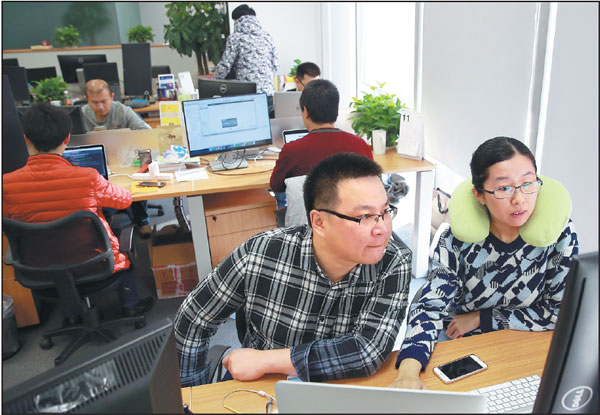Looking to crack the unwritten code
|
Zhang Danli (right), a 32-year-old female software engineer, works with a colleague at the offices of Mtime, an online movie portal in Beijing.Zou Hong / China Daily |
Independent clubs are addressing the gender imbalance that discriminates against women in China's tech sector. Xu Wei reports.
The question software engineer Wang Jing is asked most frequently focuses not on how a person learns to write code, but how a woman learns to write code.
Wang, a 28-year programmer for a video-hosting service in Beijing, said people's curiosity about how she managed to land a job as a programmer is almost troubling.
"They ask 'How on earth did you become a programmer'? and 'How on earth did you land this job'?" she said.
However, the fact that she is one of just five woman programmers in a team of more than 60 also gives her a very special role, one she describes as a "mood blender" - someone who can neutralize a staid, nerdish atmosphere.

Wang believes that women can add a feminine influence to the male-dominated workplace, even though her workload is no less taxing than those of her male counterparts.
"No offense, but some programmers are just nerdish people. They don't know how to live life, but women do. We can offer snacks when the team is working overtime and decide the location of dinner parties," she said.
Outnumbered
Wang's workplace is typical of a sector long dominated by men, even though women occupy well-placed technical positions.
The gender imbalance in the industry is evidenced by several independent reports conducted and published by programming websites in China.
According to statistics released in October by 100offer, a website that provides employment opportunities for software engineers, men outnumber women by 4-to-1.
A report published in 2014 by Codeforge, a source-code sharing website, showed that only 20 percent of programmers in China are female.
The Codeforge report, which polled more than 1 million programmers, also found that the gender imbalance is driven by the nature of the job, including the irregular lifestyle that results from the frequent need to work extra hours.
Wen Yang, who started the Coding Girls Club, an organization in Beijing that offers free programming seminars and training courses for women, said the unfair treatment of women in the sector is not obvious until it comes to salaries.
"Mostly, this unfair treatment is not obvious or palpable. The ideological indoctrination that women are not suitable to work as programmers and have poor logical thinking is behind the gender imbalance in the industry," he said.
"This ideology and indoctrination is a form of bias in the strongest and most far-reaching way."
Hostile attitudes
China's booming internet sector has resulted in growing demand for programmers. According to a 2015 report by the US management services researcher Boston Consulting Group, the internet industry - which maintained compound growth of 50 percent between 2011 and 2014 - was directly responsible for the creation of 1.7 million jobs in China in 2014.
However, according to the 100offer report, the highly competitive industry has displayed a hostile attitude toward female programmers, who are generally offered lower salaries than their male counterparts for the same position.
For positions in either Java programming or front-end development, male programmers are usually offered 10 percent, or 3,000 yuan ($432.50) to 4,000 yuan, more than their female equivalents.
"During the recruitment process, many companies worry that female programmers will marry and have children at some stage, which means they will have to devote a substantial amount of time to their family life," said Kang Wenjuan, a recruitment consultant with 100offer.
The company's report also found that the wage gap widens with experience - the salary gap between male and females programmers is about 24 percent for those with more than five years' experience.
The problem has also been noted by Hired, a job search platform in the United States. In a report published last year, the platform said that there is a wage gap of 7 to 8 percent between male and female software engineers in Silicon Valley.
"On average, we found that companies offer women 3 percent less than men for the same roles, with some companies offering as much as 30 percent less," the report said.
Kang, from 100offer, said her company's research established that age is also a major factor in the employment of female programmers. Those ages 26 to 29 and with three to four years work experience have a significantly higher chance of landing a job with an internet company. After that, things begin to deteriorate.
"There are significantly fewer opportunities for female programmers ages 30 or older. The situation is particularly bad for those who are single, and those who are married but have not yet had children," she said.
The gender bias is also deep-rooted, according to a paper published in July by researchers at California Polytechnic State University and North Carolina State University.
They found that when a female programmer in the US contributed to an open-source project, the work was more likely to be accepted by their peers than contributions by men, but only if the people judging the work were unaware that the programmer was female. The same work was more likely to be rejected if their gender was made public.
The researchers suggested that female programmers are at least as competent and sometimes more skilled than the average programmer on GitHub, one of the world's largest web-based hosts of source code. "It shows that women face a giant hurdle of 'gender bias' when other people assess their work," they said.
Kang, the recruitment expert, said 100offer is optimistic that its report will attract greater attention to the income disparity between male and female software engineers.
"The situation will only improve when more female programmers join the workforce. We also need events to motivate female coders and entrepreneurs to speak up," she said.
Proficiency is paramount
However, not all female programmers have found the gender bias so obvious.
Zhang Danli, a 32-year-old who works for Mtime, an online movie portal, said gender only plays a minor part, and programming proficiency determines a person's position in the workplace.
"Some startups might prefer young, male programmers because they are more adaptable to working extra hours. But for some major corporations, gender is no longer an issue," said Zhang, who has changed employers three times in the last six years.
Su Xunbo, Zhang's team leader who is responsible for the development and maintenance of Mtime's app, said female programmers offer diversity to his team, which is composed of two women and six men.
"Programmers' meetings can be at daggers drawn. In the midst of red faces and even clenched fists, a woman's voice can have a surprising effect, including the power to calm everyone down," he said.
However, Wen Yang, from Coding Girls Club, said his organization believes that women deserve the right to use programming as a springboard for their careers, and it has set a target to provide programming training to 1,000 women across China in the next three years.
"Programming is essentially an intellectual activity, an area with no gender differences. We believe there is a trend by which the gender imbalance will disappear in the future," he said.
"It is a not a matter of whether it will happen, but when it will happen."


















